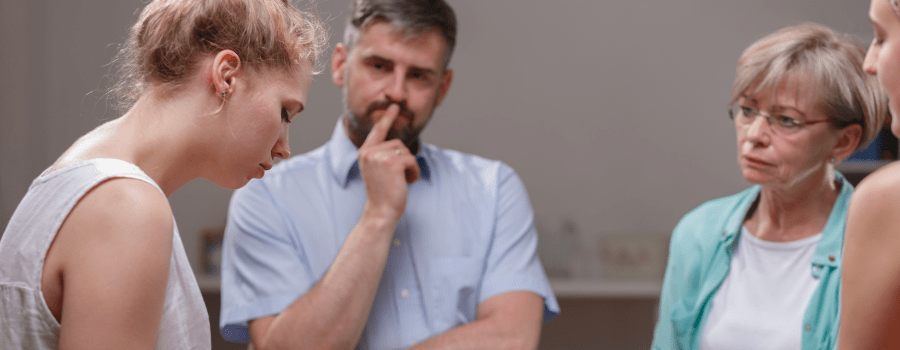For many people the prospect of going to rehab is quite scary – particularly if they have no idea what happens in inpatient drug rehab clinics and what the process is like.
If you or a loved one is thinking about seeking drug addiction treatment at a drug rehab facility, this is the article for you; we’re going to take you through everything you need to know – from process right through to what items to bring with you.

What is a typical day in rehab like?
Let’s begin by talking about a typical day going through addiction treatment in a drug rehab facility:
Morning – Breakfast and Light Therapies
The majority of addiction rehab facilities tend to serve breakfast between 7:00am and 8:30am. This allows the inpatients enough time to wake up, take a shower, get dressed for the day, and then enjoy a healthy and hearty breakfast.
Once you have eaten your breakfast, you will then be ready to prepare for the day ahead. It is common practice for a rehab centre to provide a journal which should be filled in every morning before your therapy sessions begin.
Your typical addiction treatment therapy sessions will likely begin around 9:00am and 9:30am. These morning therapy sessions are holistic in nature, such as yoga and meditation to help you relax, clear your mind, and be better prepared for the therapies to come.
This is good practice and many rehabilitation experts encourage inpatients to continue with a similarly structured routine after completing their rehab programme.
Next up you will likely begin your morning group therapy sessions. These therapy sessions will be led by a counsellor, though you will be provided with a platform where you can discuss your alcohol and drug abuse with your peers as well.
This is when you can delve deeper into the issues related to your substance addictions. You will be armed with recovery tools, prevention techniques, and as much knowledge as possible to help you recognise and identify the patterns of behaviours that likely fuelled your addiction to begin with.
Afternoon – Intensive therapy
During the afternoon in a typical rehab centre you will begin to explore the heavier issues in individual therapy sessions with certified addiction counsellors.
As you will have had a healthy breakfast and plenty of time to get your mind working, you can comfortably begin tackling your mental health and the potent addiction triggers that may have led to your drug abuse.
It is in these afternoon sessions that you can begin to experience powerful rehab treatment, such as CBT (cognitive behavioural therapy), rational emotive behaviour therapy, and a combination of other proven therapies, depending on the nature of your addiction and what your addiction counsellors prescribed as part of your individual treatment plan.
These evidence based addiction treatments can be highly effective with helping a person overcome their drug addiction. This is because you will begin to recognise your behavioural responses and then work with addiction specialists to develop healthier alternative responses to said triggers to assist with relapse prevention.
Many rehab clinics may also prescribe family therapy sessions. These can sometimes take place later in the evening to provide flexibility for family members who may need time to finish work and get to the rehab facility.
As it is likely that your family will have been impacted by your addiction, it is believed to be highly beneficial for family members to meet at the treatment centre and engage in group therapy processes.
Afternoon – Downtime
After a busy morning and early afternoon of addiction treatment, you will be given some time off during the mid-afternoon to relax and unwind. This time will afford you an opportunity to reflect on what you’ve learned, add to your journal, interact with other patients, and kick back.
In the majority of rehab centres you can spend this time as you wish. Some people may watch TV, others will play cards, and you can even enjoy a workout in the onsite gymnasium.
Evening sessions and early night
Once your afternoon sessions and downtime have been completed you will sit down for a healthy dinner. Following that it will be time to take part in further group therapy sessions.
These group therapy sessions are typically based on some form of 12-step recovery programme (such as the AA and UKNA). Your typical evening group therapy sessions may run approximately 90-minutes.
Finally, after a long day of therapy you will be allowed to enjoy some more downtime as you settle for bed. Typically speaking, your addiction rehab treatment provider will encourage that you go to bed early, allowing you to be fully recharged for the next day’s sessions.

How does rehab work in the UK?
Alcohol and drug abuse is something that has been on the rise in recent years in the UK and it is wreaking havoc on many individuals and their family’s lives. [Source] [Source]
The good news is that there are a number of programmes in place to help people suffering with addiction get into rehab.
There are many effective and affordable drug addiction treatment organisations in the UK that are either privately or publicly funded. The NHS provides numerous services to help those in need – however, for the more severe cases of drug addiction, private residential treatment is likely to be more beneficial.
For those who have a minor addiction problem, there are local drug services funded by the NHS. These include:
- Talk therapies: these therapy types require that the addicted individual talk to a counsellor or psychologist and explore various treatments such as CBT, helping you learn how your thoughts and feelings influence your behaviour.
- Medication assisted treatment: for those who may have an opioid dependency, substitute prescription drugs may be provided to help with the withdrawal process from the physical addiction.
- Medical detox: a medically assisted detox is designed to cleanse the body of all abused substances and help you get through the severe withdrawal symptoms.
- Support groups: it may be suggested that you meet with local support groups such as Alcoholics Anonymous and UK Narcotics Anonymous to meet with your fellow peers struggling with addiction in order to discuss the nature of addiction and practice relapse prevention techniques.
It is important to remember that the quality and availability of public, NHS-funded services like these will vary from one place to the next. As such, you may find it difficult to get the level of care that you need.
This is why seeking private inpatient rehab treatment is far more effective, as you will be guaranteed a placement and can receive the care you need as quickly as possible.
Sometimes, private health insurance might cover the rehab cost, but that comes down to your insurance company, the private rehab facility, and a number of other factors.
Inpatient vs Outpatient rehab
Inpatient rehab (or residential rehab) differs from outpatient rehab significantly. The primary difference is the fact that inpatient treatment requires that the patient stay as a resident at the facility for a given length of time. Outpatient rehab on the other hand allows you to stay at home with friends and family.
In outpatient treatment, you will meet with a UK addiction treatment group and learn all of the necessary tools to help with your drug rehabilitation. This is typically intended for those who do not have a severe addiction and are simply looking for further education and the opportunity to meet with other people who understand what you are going through.
What happens in rehab UK as an inpatient is significantly different, providing the patient with a safe and comfortable environment absent any distractions from their day to day life; it allows them to focus entirely on their recovery without having to worry about work or being influenced by any outside factors.
What is the process of rehabilitation?
The rehab process may vary from one rehab clinic to the next, but you can generally expect it to follow a similar pattern:
Admissions
The addicted individual (or one of their loved ones) contacts the rehab clinic and they are enrolled. This first step is a big one, however, treatment providers make this process as easy and comfortable as possible.
Intake
When the patient enters the rehab clinic, they complete the necessary admin processes. This is when the treatment providers ensure that no forbidden items are brought in and that the patient gets off to a safe and comfortable start.
Assessment
During the assessment stage medical and clinic staff with interview the patient in order to determine the best kind of rehab programme for them. This is when the treatment centres further assess what substances the patient has been abusing (e.g., prescribed medication / illegal drug addiction), identify existing mental health issues, and customise their alcohol rehab or addiction treatment accordingly.
Detox
The medically supervised detox stage is the process by which the patient is purged of all harmful substances. That way, the patient can wipe the slate clean and start fresh. During this time medical staff will be present to help guide the patient through the painful withdrawal symptoms – making the process as safe and comfortable as possible.
Inpatient Care
During inpatient care (or residential rehab), the patient resides in the rehab facility and undergoes various treatments and therapies to help them with their recovery from alcohol and drug addiction.
Again, these treatments will vary significantly from one clinic to the next, but they are all ultimately designed to help the addicted individual learn more about themselves, understand the nature of their addiction, and develop valuable life skills to help them combat and recover from their alcohol and drug addiction over the long term.
Do all addicts need residential treatment?
No. It all depends on the individual, how severe their addiction is, and how much support they have around them. In some cases, a person may be able to work through their addiction on an outpatient rehab programme. However, inpatient / residential treatment is often the most effective and thus highly recommended.
What treatments do people receive in rehab?
The treatment options available in rehab vary significantly from one individual to the next. This is because there is no one-size-fits-all approach to addiction recovery and each case is treated individually.
Here are some examples of the treatment options available during inpatient rehab:
- Meditation
- Art therapy
- Self-love therapy
- Music therapy
- CBT
- Yoga
- Walks in nature
- Prayers meetings for religious people
- Family therapy
- Individual therapy
- Trauma resolution
- Peer group support
Behavioural therapy is perhaps the most commonly prescribed type of treatment for addiction and is frequently used during substance abuse rehabilitation. This is because it helps the addicted individual recognise and process the behaviours that may have led to their substance abuse in the first place.
Do people with different addictions get treatment together?
It is not uncommon for people with different addictions to get treatment together. For example, you frequently see people who suffer from alcohol abuse, or with both drug and alcohol addiction recovering in rehab clinics together.
You may also take part in group therapy sessions designed to identify triggers and negative behaviours with individuals suffering from a gambling addiction. A treatment provider often specialises in the broader scope of addiction which can affect many people differently.

What to take with you into rehab
What you can take with you into rehab is quite limited and varies from one facility to the next, for yours and your fellow inpatients safety. Here’s an example of what you can bring with you:
- A list of names and contact information for those you want involved with your treatment
- While you can bring a wedding ring or sentimental jewellery with you, it is advised that you leave all valuables at home
- Any current prescription medication
- A small amount of cash
- Identification
- Pictures of your loved ones
- Reading materials
- Comfortable clothing
- Fitness wear
- ‘Dress attire’ for any formal family occasions
- Any other clothing deemed appropriate and comforting
- Personal hygiene items and regular toiletries
Make sure you speak with your inpatient treatment facility before you enter to make sure that you have a thorough understanding of what can and cannot be brought into the centre with you.
What is the average time spent in rehab?
The amount of time spent in rehab can vary anywhere from 1-day to over 6-months. However, the average and most typical time spent in residential rehab is between 30 and 90-days.
Who decides when the rehab ends?
Ultimately, someone can leave at any time they wish. Unless rehab as been court ordered, anyone over the age of 18 can leave when they want to, though the rehab facility staff will do everything they can to persuade them otherwise.
The first and second day is the most common time for people wanting to leave. This is because it sinks in that they will be away from their loved ones for an extended period of time.
Those who make it past the few days are most likely to want to leave treatment after 48 to 72-hours when they are experiencing withdrawal symptoms from highly addictive opioids and benzodiazepines.
Following that, people are susceptible to leaving rehab after 7 to 14-days; either because they believe they have been cured or simply want to use drugs and alcohol again.







